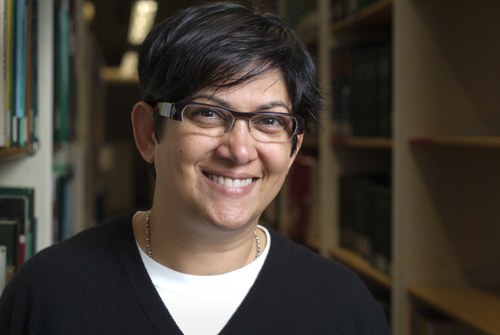
After being asked many times why she writes fiction, Shani Mootoo decided to answer the question in a uniquely academic way. She made it the topic for her Guelph master’s thesis in English. The full title of the thesis is ‘Writing Fiction, Reading Theory: A Self-Reflective Exploration of How and Why I Write Fiction and the Role of Politics and Theory Therein.”
“It’s actually been a great opportunity to reflect on what my fiction is and why I’m writing it,” says Mootoo. As she completes her thesis defence, she’s already ensconced in a new undertaking, serving as writer-in-residence at U of G.
Her writing credits are unquestionably impressive. She’s the author of three novels (one long-listed and one short-listed for the Giller Prize), a short-story collection and a book of poetry, all of them exploring issues of identity, sexuality and gender, and Mootoo’s life as a child in the Caribbean and an adult in Canada. Her previous experiences as a writer-in-residence at the University of Alberta and a creative writing teacher have given her considerable enthusiasm for taking up this position at Guelph.
In fact, Mootoo considers the writer-in-residence position “an amazing gift.” She adds: “I hope it will ─ I know it will – give me the space to concentrate on three tasks. One is to finish the novel I am currently working on. The second is to see people who bring their work to me for help with their own writing. The third is to sort through my material for Simon Fraser University, where they are archiving my papers. I’m supposed to send them a box every year or two, and I’ve gotten behind.”
Mootoo began her creative career by making videos and still uses this visual art form to tell some of her stories. “I recently did a video on the G20 summit and the fiasco of the police management of security. It’s called Friday because it was on the Friday that we saw the shift in the police tactics.”
Her background in visual arts helps her in her work with students, she says, because sometimes writing is not the best medium for telling a story. “I am more consciously aware of choosing the medium to tell my story, and if writing is the best choice, I think knowing that can enhance the story.”
For Mootoo, writing is largely a process of discovery. “I usually start with some small thing, sometimes an image, sometimes a phrase. I do this kind of work so much that I am constantly unconsciously creating, but what usually leads to a book is an image that grips me. I keep thinking about it. I want to know what led up to it,” Mootoo explains.
Her current book started with this image: a woman who is setting out on a walk at seven in the morning, in the depths of winter in Toronto. She could call a cab ─ cabs are driving past, but she waves them on ─ and she insists on making this walk despite the snowstorm. She is feeling somewhat euphoric.
“Everything you experience or read or hear from others becomes part of your artist’s palette as a writer, but some images will grip you and others won’t. Some suit your own longings or temperament,” Mootoo suggests.
But of course that compelling image is just the beginning. “Then you have to find out what the story is,” Mootoo says. “I write like a reader would read, not knowing what is coming. If I wrote out a plan for the book and followed it, that would be easier, I think, but there would be no adventure, no mystery. I enjoy seeing how the story unfolds.”
At the end of that discovery process, though, Mootoo says she has to take control of the book she has written and “fashion it into something. At this point I can see a plan and a structure that works, but the plan comes very late in the writing process. I can’t write an outline until the book is written, but then I can revise according to that plan to make it all work.”
For her, that’s the biggest difference between writing academic essays or non-fiction and writing fiction. “For essays, you start with a plan. For fiction, you come to know what your story is about only after writing it,” she says.
Revising is no small step, either. “I might have 300 pages written, but now I have to ask myself ‘what is the correct structure for this story? Am I telling it the right way?’ I pay strong attention to the style and texture of the language as well. To me, it’s not just the story that’s important; it’s also how you tell the story.”
Mootoo will be in her office in Massey Hall on Wednesday and Thursday of most weeks and will help students and other members of the Guelph community with fiction, poetry and creative non-fiction.